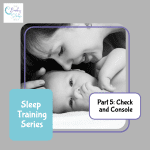 Is it always clear when you are done sleep training? Not for everyone, unfortunately. Success in sleep training, like so many things, is on a continuum. What is success for you might not be for someone else.
Is it always clear when you are done sleep training? Not for everyone, unfortunately. Success in sleep training, like so many things, is on a continuum. What is success for you might not be for someone else.
It also depends on your expectations and what your goal is from sleep training.
For some parents, sleep training means allowing their baby to fuss a few minutes and voila, they start to sleep 10-12 hours a night. For other parents, it won’t be quite as smooth. They might take 2-3 weeks using a no-cry sleep training method and have a baby who sleeps 10-12 hours per night.
Or, parents might use acry it out method and in 2-3 nights, they are also sleeping through the night.
Still, there are the few of us who don’t fall into either camp. We struggle on and off for the better part of however much time it takes. We get on a path that starts to work and then baby gets sick. Perhaps we start seeing some improvement and baby gets teeth. Our toddler has a language explosion, starts to walk, or starts to have nightmares, and we fall back once again. We have a new baby and our toddler stops napping, becoming a mess before bedtime. The setbacks can be numerous.
How do you know when you’re done?
This is what “finished” looks like.
For many, it will be obvious when you are done because you will be well-rested and, most importantly, so will your baby. You may have temporary setbacks, but your baby bounces back to normal quickly. But, what if you’ve done cry-it-out and your baby is still crying every night? What do you do? Does that mean it didn’t work?
If your baby fusses or cries lightly for 5-10 minutes, drifts off to sleep and you don’t hear a peep for 10-12 hours except for feedings, you most likely just have a baby who unwinds a little before sleep. When my baby was in a good place, he would often unwind, almost moaning or humming himself to sleep.
I think it’s possible that a stranger might think he was crying or fussing, but I knew him best and I know he wasn’t crying. He would sleep well at night, and there was a time that I’d go in too early in the morning where he’d be “talking” and would fuss at me for coming in too soon! Most importantly, he was very happy in the morning with a good night’s rest.
If your baby is crying hard for 10 minutes, then settles down, it’s still possible that that’s going to be as good as it gets for the time being. We have been at this stage, too, unfortunately. We went through a time my son would cry hard for 5-10 minutes, we’d go in and re-settle him and he’d go right to sleep. It was a little frustrating, but fairly easy to deal with. Knowing him today, no doubt it was the same reason as now that he just didn’t want the day to end, even though he was exhausted.
This is what “still working” looks like.
If your baby is crying hard for over 10 minutes (I am generalizing — you know your baby best) and it’s been longer than a week of sleep training, most likely you have a lingering problem. In babies, this problem is probably over-tiredness and you need to bump bedtime EARLIER.
Even after sleep training, my son would get over-tired, over-stimulated, and cry at bedtime some nights. He was fed, dry, etc. and was just TIRED! It was very frustrating. We couldn’t soothe him all the way to sleep every time because that led to our 3 hour rocking marathons every night. Or, worse, waking every so many hours for re-rocking / re-soothing.
My husband and I were still basically at the best place we could be at the time. We tried with everything we had to keep bedtime early enough. Even now, he will get cranky when he’s tired, but insists “I’m not tired!” Then promptly falls asleep 5 minutes later, literally.
For toddlers, crying at bedtime or resisting bedtime could be over or under-tired, depending on the schedule and temperament. Without knowing the specific details, it’s difficult to know which one it is. In general, if your toddler was going to bed fine and all of a sudden started fighting the routine, she may need a longer wake-time before bedtime. If she recently transitioned naps, you might need to consider less.
There are many times you might have setbacks. If things haven’t improved in 2-3 weeks, regardless of the method, you might want to re-evaluate your chosen method to get your baby or toddler to sleep.








